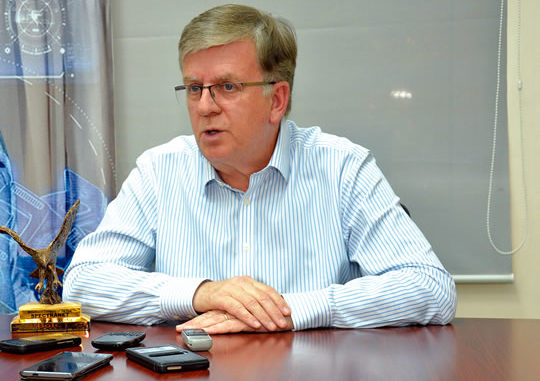
The Chief Executive Officer, Spectranet Nigeria, Mr. David Venn, speaks to OZIOMA UBABUKOH on the infiltration of 4G networks and the country’s telecoms market, among other issues
The major telecoms firms in Nigeria are in a rush to launch the Fourth-Generation (4G) Long-Term Evolution network. What is the difference between 3G and 4G?
Most people in Nigeria have experienced Internet on a mobile phone of 3G and majority of them who use the Internet use their mobile phones. Many of them have not used 4G. The challenge is convincing people to try it and that it works faster. The 4G is designed for data, while 3G is designed for voice with data. It is the updated form of 2G, which is only for voice and the SMS. As a telecoms operator, when one puts 3G, one has to allocate for voice and data. But when the data is congested, one may adjust to make money from voice.
How do you think networks like yours would manage video streaming, which consumes much data?
We have seen much more video, YouTube, Netflix in our network than we used to have, and it is growing. With broadband, one can watch whatever one wants to watch on one’s phone and pay for it. When I first arrived in Nigeria about 18 months ago, most Nigerians did not want to see videos on their mobile phones. They would delete such videos on the fear that it consume data bundle. That is not the case now; the attitude is changing because the cost of data has come down. Two years ago, the cost of data was quite high but it is becoming cheaper. With this, people are streaming TV at home. The biggest threat to satellite TV is good Internet. If one has good Internet, one may not need a satellite TV.
What do you think the regulator is not getting right or need to do to improve on poor services in the telecoms industry?
In some smaller countries, it is easy to cover in terms of network, but one thing is that very big powerful mobile phone companies have dominated the Nigerian market. They have strong brands, strong distribution and make a lot of money from voice business. Again, the country is dependent on them to roll out new businesses. But the problem is that most of their revenue comes from voice call. They now see data as added revenue stream but do not see it the way I do. I see it as data replacing voice completely.
What are your challenges in the industry?
In terms of challenges, there is a lot of process to get consent to do anything. It slows things down a bit but the interesting part is that the level of brand consciousness is huge. Nigerians like quality brands and the level of education is high. People make informed choices but I am amazed by poor quality of services by mobile operators but they have genuine excuses, such as power, etc. The telecommunications sector is well structured and regulated and the regulator has a lot of impact on how the market develops.
How can you compare the Nigerian market with other markets globally?
Very different! When I was in Zambia, people told me that Zambia was Africa’s market for beginners. Ghana was a lot more dynamic with more business and commerce. When I moved to Nigeria, I was told that Nigeria was Africa’s country for men. It is dynamic, fast moving. It is a big market. I was told that if I get it right here, it could be great. This is unlike smaller markets. In Nigeria, the education level is higher than I have seen in some other markets, as Nigerians know what they want. Nigerians are also entrepreneurial and have very strong work attitude. In Nigeria, consumers are loyal to good services and it is only when one stops providing good services that people look elsewhere. For instance, people want the top brand, unlike in Bangladesh where price matters.
What is responsible for your broad knowledge of the Nigerian telecoms market?
Personally, I have worked in many markets such as Ghana, Zambia, Pakistan, Bangladesh, Australia, Hong Kong, Indonesia and America. What I have learnt from all these markets is that one needs to understand the market. That means one needs to understand what consumers want; how they use it and how it fits their lives. If one does not understand that, then one has no chance of offering services and products. In such markets as Nigeria, one relies on one’s team. Also, one needs to do a lot of research to understand the trends and how people do things.
Source: Punch
THE ROTTEN FISH: CAN OF WORMS OPENED OF APC & TINUBU'S GOVERNMENT OVER NIGERIA'S ECONOMIC DOWNTURN
WATCH THE CRITICAL ANALYSIS AND KNOW THE RESPONSIBLE PARTIES TO BLAME FOR NIGERIA'S ECONOMIC CHALLENGES, WHILE CITIZENS ENDURE SEVERE HARDSHIPS.Watch this episode of ISSUES IN THE NEWS on 9News Nigeria featuring Peter Obi's Special Adviser, Dr Katch Ononuju, 9News Nigeria Publisher, Obinna Ejianya and Tinubu Support Group Leader, McHezekiah Eherechi
The economic crisis and hardship in Nigeria are parts of the discussion.
Watch, leave your comments, and share to create more awareness on this issue.
#9NewsNigeria #Nigeria #issuesInTheNews #politics #tinubu THE ROTTEN FISH: CAN OF WORMS OPENED ...
DON'T FORGET TO SUBSCRIBE AND LEAVE YOUR COMMENTS FOR SUBSEQUENT UPDATES
#9newsnigeria #economia #economy #nigeria #government @9newsng
www.9newsng.com
